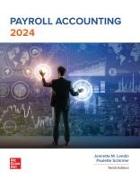Payroll Accounting 2024
BücherAngebote / Angebote:
The tenth edition of Payroll Accounting continues the author's tradition of providing a modern approach to payroll accounting incorporating coverage of real-world issues that many students will face in their careers, such as cybersecurity, payroll fraud, artificial intelligence, and labor costs. The textbook content paired with Connect materials contribute to a comprehensive understanding of payroll accounting in the twenty-first century and will make accounting students more valuable to the organizations they work for in their careers. Whether you are teaching face to face, hybrid, or online, Payroll Accounting 2024 is flexible enough to be used in courses as short as 3 weeks and as long as 15 weeks. This text is different than others because it is written with the perspective that payroll is the story of people. These people include the ones within the business who make decisions about the company's directions and the people who work for the business and depend on their paychecks to support their livelihoods. To foster the connection between business and people, each chapter's introductory story contains recent events involving payroll accounting that highlight the connections among payroll, legislation, business decisions, and people affected by all the decisions made. Chapter 1 highlights a shift in workers' attitudes to work that emanated from the changes to the work environment during COVID-19 shutdowns: the demand for a better work-life balance supported by employers. Chapter 2 discusses the current movement of refugees into the workplace and highlighted the difference between H-1B and refugee work visas. Chapter 3 explores the challenges of new pay transparency laws that have been enacted in many places. Chapter 4 explores the need for flexible benefits that suit both traditional and remote workers and the "out of sight, out of mind" challenges that remote workers face. Chapter 5 focuses on the demand for flexible pay or on-demand pay that is gaining popularity. Chapter 6 discuss the challenge of rising labor costs that employers face, many of which have resulted in layoffs. Finally, Chapter 7 introduction considers the effects of artificial intelligence, the Great Resignation, and COVID-19, all of which have led to a shortage of accountants. The author team has made content updates including updating the payroll processing options in Chapter 1 to reflect an accurate representation of the current state of the available technology used by businesses of any size. Chapter 2 explores situations where an individual may have multiple employers and how to report new employees per legal requirements. Cybersecurity and payroll is also covered in more depth in Learning Objective 2-5 to attenuate students to this growing concern. The section about cryptocurrency has been updated as a means of transmitting payroll amounts due in Learning Objective 5-6. It is important to understand that cryptocurrency as a means of paying employees, while being considered, is a complicated issue because of its connection to the stock market, as opposed to a central bank, as a basis for its value.
Folgt in ca. 15 Arbeitstagen




